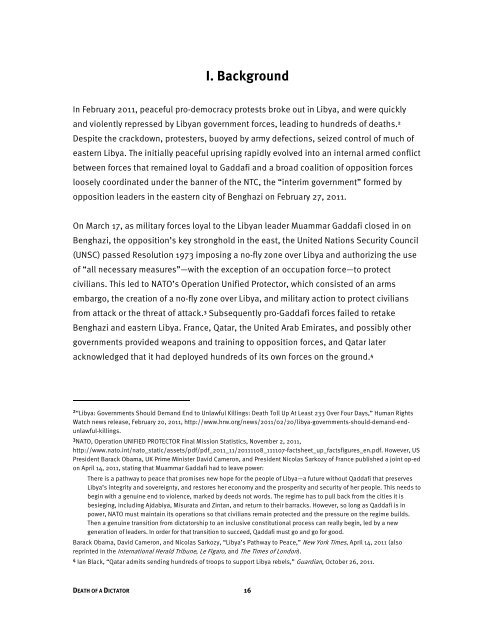Download the full report - Human Rights Watch
Download the full report - Human Rights Watch
Download the full report - Human Rights Watch
Create successful ePaper yourself
Turn your PDF publications into a flip-book with our unique Google optimized e-Paper software.
I. Background<br />
In February 2011, peaceful pro-democracy protests broke out in Libya, and were quickly<br />
and violently repressed by Libyan government forces, leading to hundreds of deaths. 2<br />
Despite <strong>the</strong> crackdown, protesters, buoyed by army defections, seized control of much of<br />
eastern Libya. The initially peaceful uprising rapidly evolved into an internal armed conflict<br />
between forces that remained loyal to Gaddafi and a broad coalition of opposition forces<br />
loosely coordinated under <strong>the</strong> banner of <strong>the</strong> NTC, <strong>the</strong> “interim government” formed by<br />
opposition leaders in <strong>the</strong> eastern city of Benghazi on February 27, 2011.<br />
On March 17, as military forces loyal to <strong>the</strong> Libyan leader Muammar Gaddafi closed in on<br />
Benghazi, <strong>the</strong> opposition’s key stronghold in <strong>the</strong> east, <strong>the</strong> United Nations Security Council<br />
(UNSC) passed Resolution 1973 imposing a no-fly zone over Libya and authorizing <strong>the</strong> use<br />
of “all necessary measures”—with <strong>the</strong> exception of an occupation force—to protect<br />
civilians. This led to NATO’s Operation Unified Protector, which consisted of an arms<br />
embargo, <strong>the</strong> creation of a no-fly zone over Libya, and military action to protect civilians<br />
from attack or <strong>the</strong> threat of attack. 3 Subsequently pro-Gaddafi forces failed to retake<br />
Benghazi and eastern Libya. France, Qatar, <strong>the</strong> United Arab Emirates, and possibly o<strong>the</strong>r<br />
governments provided weapons and training to opposition forces, and Qatar later<br />
acknowledged that it had deployed hundreds of its own forces on <strong>the</strong> ground. 4<br />
2 “Libya: Governments Should Demand End to Unlawful Killings: Death Toll Up At Least 233 Over Four Days,” <strong>Human</strong> <strong>Rights</strong><br />
<strong>Watch</strong> news release, February 20, 2011, http://www.hrw.org/news/2011/02/20/libya-governments-should-demand-endunlawful-killings.<br />
3 NATO, Operation UNIFIED PROTECTOR Final Mission Statistics, November 2, 2011,<br />
http://www.nato.int/nato_static/assets/pdf/pdf_2011_11/20111108_111107-factsheet_up_factsfigures_en.pdf. However, US<br />
President Barack Obama, UK Prime Minister David Cameron, and President Nicolas Sarkozy of France published a joint op-ed<br />
on April 14, 2011, stating that Muammar Gaddafi had to leave power:<br />
There is a pathway to peace that promises new hope for <strong>the</strong> people of Libya—a future without Qaddafi that preserves<br />
Libya’s integrity and sovereignty, and restores her economy and <strong>the</strong> prosperity and security of her people. This needs to<br />
begin with a genuine end to violence, marked by deeds not words. The regime has to pull back from <strong>the</strong> cities it is<br />
besieging, including Ajdabiya, Misurata and Zintan, and return to <strong>the</strong>ir barracks. However, so long as Qaddafi is in<br />
power, NATO must maintain its operations so that civilians remain protected and <strong>the</strong> pressure on <strong>the</strong> regime builds.<br />
Then a genuine transition from dictatorship to an inclusive constitutional process can really begin, led by a new<br />
generation of leaders. In order for that transition to succeed, Qaddafi must go and go for good.<br />
Barack Obama, David Cameron, and Nicolas Sarkozy, “Libya’s Pathway to Peace,” New York Times, April 14, 2011 (also<br />
reprinted in <strong>the</strong> International Herald Tribune, Le Figaro, and The Times of London).<br />
4 Ian Black, “Qatar admits sending hundreds of troops to support Libya rebels,” Guardian, October 26, 2011.<br />
DEATH OF A DICTATOR 16

















